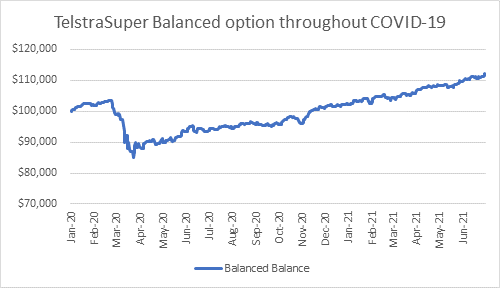An important lesson to learn
August 20, 2021
What a roller coaster ride!
It wasn’t long ago in early February 2020 that global equity markets were riding high; that was until late February when world markets went into free fall due to the COVID-19 pandemic, with 34% wiped off global equities by mid March 2020*. And now? World markets have not only recovered from the market fall, but over the last 12 months or so, they’ve surged, resulting in record returns for the financial year ending 30 June 2021.
If these dramatic ups and downs in the market have proven anything—it’s not to panic. Investments like superannuation are for the long-term and you should expect some volatility along the way. It can be a nerve-wracking journey, but history has generally shown that when markets take a big hit, they also tend to recover, and those investors that stay with their strategy instead of changing it, often reap the benefits over the long term.
Let’s have a better look at this rollercoaster ride and see the effects of a volatile market on a $100,000 super balance from January 2020 to June 2021. The graph below shows an investor that decided to stay the course with their TelstraSuper balanced investment option and ride out the market crash.
If the market falls again, what should you think about?
We’re likely to be living with market volatility for some time, so it’s important to consider what you’ll do if markets crash again. Will you ride it out and stick with your current investment strategy? Or if you’re concerned about the prospect of future volatility, would you prefer to switch to a more conservative strategy now?
It’s important, now more than ever, to decide on your appetite for risk regardless of how the markets are performing, and to avoid making knee-jerk or panicked reactions to market movements where that’s not appropriate for you. Super is for the long-term and you can generally expect low or negative returns from time to time particularly if you are invested in riskier options.
Need help?
We don’t have a crystal ball so it’s impossible for us, or anyone, to predict what will happen with investment markets going forward.
If you’re unsure of your risk tolerance you can get general advice or information about your investments over the phone by speaking with an Adviser from TelstraSuper Financial Planning. This type of advice won’t cost you anything extra as it’s included in your membership fees.
We recommend that you consult a financial adviser if you require financial advice that is tailored to you. To book an appointment with a TelstraSuper Financial Planning Adviser call 1300 033 166 or fill in the online form and an Adviser will call you back.
See the our website for the latest market updates from our Chief Investment Officer, Graeme Miller.
*Source: Bloomberg, TelstraSuper^The graph shows actual investment returns for the option from 1 January 2020 to 30 June 2021. There is the assumption that no additional contributions or withdrawals have been made during this period. Past performance is not a reliable indicator of future performance.


